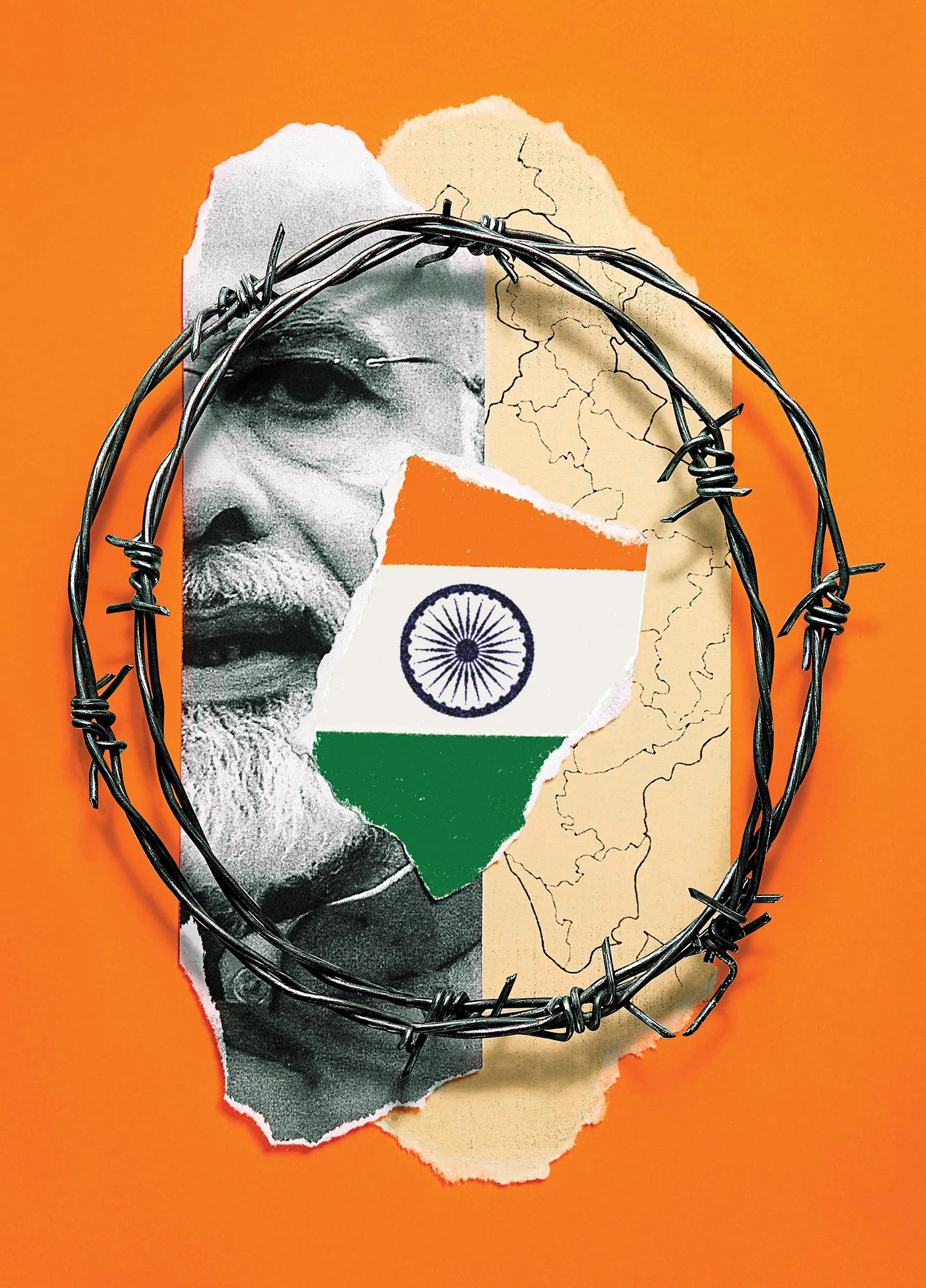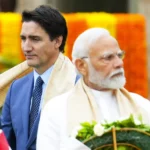A new BBC documentary about the Indian Prime Minister, Narendra Modi, has stirred great controversy in India, where the government has now resorted to censoring online discussion of the film. The first part, which aired on January 17, traces Modi’s ascent to a premiership, his affiliation with the Rashtriya Swayamsevak Sangh (RSS), and his notorious role in the 2002 Gujarat Riots, where he was then serving as the state’s chief minister. Although the majority of the documentary is composed of Modi’s archive footage, it also contains a rather shocking revelation regarding a covert British investigation into the Gujarat riots.
Modi: “The Butcher of Gujarat”
With two decades gone by, the content of the two-part documentary may be truly startling for many across the world. Still, it is merely a stark reminder of a horrific episode that marked the rise of the “Butcher of Gujarat” in the region.
The initiation of the violence in Gujarat is attributed to the burning of a train in Godhra on February 27, 2002, which caused the deaths of 58 Hindu pilgrims and ‘karsevaks’ returning from Ayodhya. Despite having been categorized as a communal riot, the events of 2002 have been referred to as a pogrom by numerous academics. Moreover, some observers have claimed that the attacks were premeditated and that the attack on the train served as a staged trigger for the actual violence. Others have described these events as state terrorism or ethnic cleansing or asserted that they met the legal definition of genocide. According to scholars who have rigorously studied the riots, they were planned and amounted to a state-sponsored act of ethnic cleansing, with both the state government and the police complicit in the bloodshed that took place. As per official statistics, 1,044 people died in the riots, with 254 Hindus and 790 Muslims among the deceased. Additionally, 2,500 were reported injured while 223 are still missing. According to the Concerned Citizens Tribunal Report, as many as 1,926 people may have died. Other sources have claimed the number of fatalities to have been more than 2,000. Besides several reports of savage killings, rapes, widespread looting, and property damage were a glaring feature of the riots.
For a long time, allegations that the violence was endorsed by police and government officials—who supposedly handed lists of Muslim-owned houses to the rioters and directed them—have been leveled. Even after becoming prime minister in 2014 and winning reelection by a landslide in 2019, charges against Modi have persisted despite his repeated denials of any wrongdoing during the violence. Even as recently as last year, India’s Supreme Court cleared Modi of all charges after dismissing a petition that disputed the conclusions of a Special Investigation Team (SIT) report on the riots that exonerated him and 62 other senior government officials. In spite of this backdrop, the new documentary has been branded a “propaganda piece” by the Indian government because it purportedly exhibits bias, a lack of objectivity, and a BBC attitude that is still rooted in colonialism.
Baseless Propaganda, or International Embarrassment?
A previously unpublished report from the UK Foreign Office, which holds Modi directly accountable for the “climate of impunity” that allowed the violence in Gujarat to occur, is presented in the documentary as it attempts to examine the relationship between the Prime Minister and Muslims—India’s largest minority group. The said report was a part of the investigation that Jack Straw, the then-foreign secretary, had requested. Therein, it was claimed that the level of violence was significantly higher than what had been reported and that the riots’ purpose was to drive Muslims out of Hindu neighborhoods. According to the report, this intentional campaign of violence had all the characteristics of ethnic cleansing that was politically motivated. It also reveals that the widespread and systematic rape of Muslim women was a feature of the violence that unquestionably originated from Modi. Additionally, the Vishwa Hindu Parishad (VHP), a far-right organization connected to the RSS, is also blamed for the events in the documentary. It is noted that the members of the organization could not have carried out such extensive violent crimes without the climate of impunity provided by the state government. The documentary also makes reference to a 2012 European Union inquiry report that concluded that ministers actively participated in the rioting and that senior police personnel had been given orders not to intervene. Former police officers who had previously testified in court about attending a meeting when Modi issued these directives and have since been detained in other cases. The documentary notes that as long as Modi is in charge, there would be no chance for reconciliation with individuals making these claims—citing alleged persecution of people who spoke out against the previous state government. It alludes to the testimony from former Gujarat police intelligence head RB Sreekumar and state police officer Sanjiv Bhatt, who said that Modi had instructed the police to remain silent.
A Reverberating Reality
In light of the claims made by the documentary, it is vital to remember those events that have been in the public domain for years. The VHP had demanded a countrywide strike in response to the train attack. Strikingly, the state did nothing to stop the strike, despite the fact that such strikes were illegal and unconstitutional according to the Supreme Court, and the fact that such strikes often result in bloodshed. The initial wave of violence that spread throughout the state was not attempted to be stopped by the authorities.
According to unofficial accounts, Rana Rajendrasinh, the state’s BJP president, had condoned the strike, and Modi and Rana employed provocative rhetoric that made matters worse.
The attack on the train, according to then-Chief Minister Modi, was labeled a terrorist act rather than a case of communal violence. In fact, the notion that the attack on the train was carried out by Pakistan’s intelligence agency and that local Muslims had plotted with them to attack Hindus in the state was used by local newspapers and members of the state government to stir violent sentiment against the Muslim community. Local publications also propagated false reports that Muslim individuals had abducted and raped Hindu women.
As per numerous accounts, the attacks on the Muslim community that started on February 28—the day after the train attack—were well-coordinated and used government-issued printouts that listed the houses and businesses of Muslims. Trucks carrying attackers in khaki shorts and saffron robes made their way toward Muslim settlements throughout the region. They frequently set ablaze or damaged Muslim-owned or -occupied buildings while leaving the Hindu structures next to them unharmed. Some have claimed that despite many calls to the police from victims, the police informed them that “we have no orders to save you.”
It is obvious that numerous attacks targeted Muslim women and children as well as Muslim populations.
To this end, Human Rights Watch and other organizations criticized the Gujarat state government and the Indian government for failing to address the plight of the victims, the “vast majority of them Muslim,” who abandoned their homes for relief camps during the violence. Teesta Setalvad said on February 28 that all forty people killed by police firing in Ahmedabad’s Morjari Chowk and Charodia Chowk neighborhoods were Muslims. Furthermore, sexual violence was being utilised as a tactic for intimidating women belonging to minority groups, according to a report from an international fact-finding commission made up entirely of women and composed of experts from the US, UK, France, Germany, and Sri Lanka. At least 250 women and girls are thought to have been gang raped before being burned to death. Pregnant women were gutted and then shown their unborn child’s body, while children were force-fed gasoline before being lit on fire.
Diplomacy: The Changing Tide
In response to the violence, the United Kingdom, the United States, and numerous European countries then imposed a de facto travel ban on Modi. Later, he was denied a visa to the US in 2005 due to his involvement in a significant breach of “religious freedom.” He had received a speaking invitation from the Asian-American Hotel Owners Association to visit the US. However, 125 academics signed a petition asking for Modi’s diplomatic visa to be denied, which was started by the Coalition Against Genocide under the leadership of Angana Chatterji.
Undeniably, Modi has been in the past decade actively courted as a crucial ally by both the US and the UK. Seen by the west as a crucial defence against Chinese dominance in Asia, the times have changed the tide of diplomacy in favor of India–regardless of the new wave of naked, controversial truths.
Your go-to editorial hub for policy perspectives and informed analysis on pressing regional and global issues.



![Muslim female students wearing hijabs are denied entry to classrooms in Udupi, reflecting rights violations in India's Karnataka [Image Credits: AP]](https://southasiatimes.org/wp-content/uploads/2022/02/202202asia_india_udupi_hijab-150x150.webp)

Add a Comment